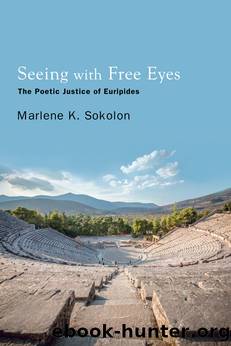Seeing with Free Eyes by Marlene K. Sokolon;

Author:Marlene K. Sokolon;
Language: eng
Format: epub
Publisher: State University of New York Press
Published: 2021-08-15T00:00:00+00:00
Chapter 9
The Electra
The Justice of Good and Bad Judgment
In making distinctions, how does anyone judge
such things in a straight line?1
Euripidesâs Electra has the âdistinction of being the best abused and not best understood of ancient tragedies.â2 It tells a familiar story: the siblings Electra and Orestes plot revenge against their mother Clytemnestra for murdering their father, Agamemnon. This family saga was so popular in ancient Athens that we have extant versions by all three playwrights, including the only surviving trilogy: Aeschylusâs Oresteia. For both Sophocles and Euripides, only the story of sibling vengeance has survived. This part of the family saga is laden with moral paradox. So horrific is matricide that the ancient goddesses of vengeance, the Erinyes (Furies in Latin), pursue violators to the end of time. Yet, the mother is no saint: she bedded Agamemnonâs greatest rival, murdered their father, and usurped Orestesâs political inheritance. To complicate matters, the Olympian Apollo contradicts these vengeance goddesses by commanding matricide. Euripides throws open the question of justice in this play: no moral standard is certain, no action is straightforward, and no one is innocent.
Another of the alphabet plays, the performance date and companion tragedies are uncertain. Traditional scholarship dates the Electra to 413 BCE, as the mention of rescuing ships in Sicily is considered an allusion to the ill-fated Sicilian Expedition.3 Other scholars see an anticipation of Euripidesâs Helen of 412 BCE or a response to Sophoclesâs also undated Electra, which was probably produced between 416 and 410 BCE.4 Although the performance date of this tragedy remains elusive, Sewell suggests it âalmost certainly was written between the sailing [to Sicily] and news of its miserable end ⦠but, [one] can imagine him writing it even later, when so many young friends and kin were dead, maimed, or hostage slaves.â5
These possible allusions to the real world, no matter how opaque, have long been the source of Euripidean criticism.6 Certainly, Euripidesâs âfondness for de-mythologicalization ⦠jars us abruptly out of the mythical world [and] into ⦠the late fifth-century Athenian reality.â7 Other scholarship investigates wider possibilities of Euripidean realism.8 Lush, for example, explores how the disruption of norms establishes Euripidesâs dramatic world.9 Adding to this perspective, this analysis focuses on how an understanding of justice requires confronting the uncertainty embedded both in authority and standards of judgment. Most importantly, the very act of thinking about justice forces us to question what influences our own judgment of circumstances, other people, and ourselves. Thus, Euripides turns his audience away from a question of âwhat is justice?â toward the first steps of an unfolding journey of self-examination.
Download
This site does not store any files on its server. We only index and link to content provided by other sites. Please contact the content providers to delete copyright contents if any and email us, we'll remove relevant links or contents immediately.
The World Almanac and Book of Facts 2021 by Sarah Janssen(797)
The emperor wears no clothes by Jack Herer(334)
The Crises of Civilization by Dipesh Chakrabarty(292)
History of India: A History In 50 Events by Hourly History(252)
The Way Home by Unknown(239)
Prehistoric Europe by Champion Timothy. Whittle Alasdair. Shennan Stephen. Gamble Clive(220)
Hidden Links by Zac Sangeeth & Sangeeth Varghese(218)
A Military History of the Cold War, 1962â1991 by Jonathan M. House(216)
Flood Legends: Global Clues of a Common Event by Charles Martin(205)
The History of Human Marriage by Edward Westermarck(198)
Darius in the Shadow of Alexander by Pierre Briant(194)
History of the Jews: An Enthralling Guide from Ancient Times to the Present (Religion in Past Times) by Wellman Billy(192)
The Education of Historians for Twenty-First Century by Thomas Bender; Philip F. Katz; Colin A. Palmer(184)
Chinese History: 500 Interesting Facts About China (Curious Histories Collection) by Ahoy Publications(184)
Big Tent by Mallory Factor(170)
Other Pasts, Different Presents, Alternative Futures by Jeremy Black(165)
Ancient Roman Sports, A-Z : Athletes, Venues, Events and Terms by David Matz(161)
The Philosophy of Historiography by John Lange(160)
Mark Of The Scots - Cl by Duncan A. Bruce(154)
